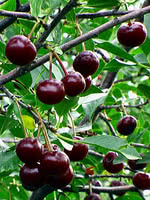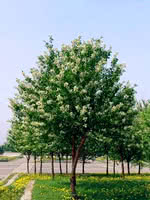Mon-Fri 9am - 5pm Mountain time
Romeo Cherry vs Klondike Amur Cherry
Prunus x kerrasis Romeo
Prunus maackii Jefdike
NOT AVAILABLE THIS SEASON - MIGHT RETURN
Romeo Cherry is a cold-hardy dwarf sour cherry. The dark red fruit are known for being sweeter than other varieties, often considered one of the sweetest dwarf sour cherries. It is typically highly productive, and the cherries are well suited to fresh eating, baking, and preserves. In the spring, beautiful white flowers cover the branches, adding ornamental value.
Romeo Cherry was developed at the University of Saskatchewan. It is recommended to grow dwarf sour cherries as a shrub rather than a small tree. The shrub form tends to bear fruit earlier and is less susceptible to winterkill.
Sour cherries are self-fertile; however, planting with additional varieties for cross-pollination can increase yields.
The Klondike Amur Cherry is an attractive cultivar which features showy, peeling gold bark and textured oval leaves that turn bright yellow in fall. It blooms with fragrant white flowers in mid spring, and produces tiny, tart black berries through the summer. The Klondike Amur Cherry was bred to have improved stem strength and stronger branching.
This tree makes a great addition to urban gardens and commercial planting, and is immune to black knot.

